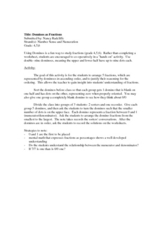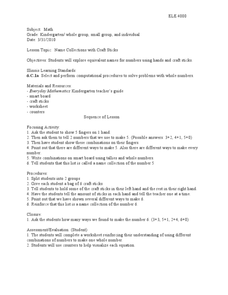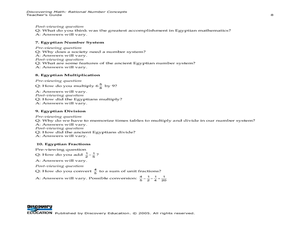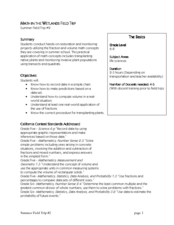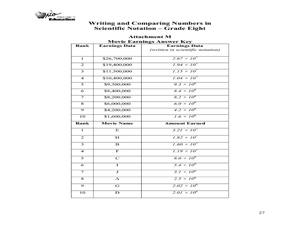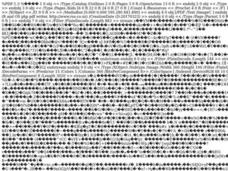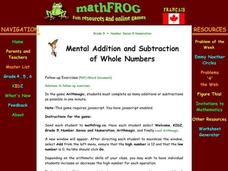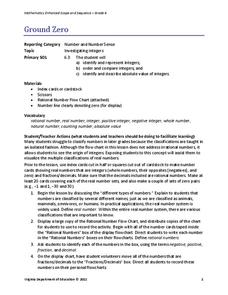Curated OER
Number Recognition Games
Students explore number sense by participating in a math recognition activity. In this number identification lesson, students practice pronouncing names of numbers and matching the number with an amount of objects. Students practice...
Curated OER
Get On Board
Students create a ticket table illustrating the cost of tickets by alternative transportation. In this number sense lesson, students write number sentences to compare and contrast difference information in their chart. Students figure...
Curated OER
Dominos As Fractions
Students investigate the concept of using fractions in a variety of different contexts. They participate in a hands on activity in the stead of book work. The goal is to get them acquainted with the use of fractions using mental math...
Curated OER
Using Negative Numbers
Fourth graders explore negative numbers with this resource. They discuss positive and negative numbers by counting who is present and absent, placing numbers on a number line, and graphing temperatures. Using a variety of activities,...
Curated OER
Math computation
The lesson says it is intended for 4th grade but it is suitable for grades 1-3 as well. The class discusses what it means to add, the commutative property of addition, and mathematical reasoning. This is an exercise in number sense,...
Curated OER
Name Collections with Craft Sticks
Groups of Kindergarten students count craft sticks in different groups and name how many they have. They complete simple addition to ten with the use of manipulatives.
Curated OER
Discovering Math: Rational Number Concepts
Pupils explore the concept of Egyptian contributions in mathematics. In this Egyptian contribution lesson, students research Egyptian hieroglyphics and pyramids. Pupils write numerals in hieroglyphics. Students use Egyptian methods to...
Curated OER
Add It Up In Number Ville! Adding 2-Digit Numbers With and Without Regrouping
Students explore adding 2-digit numbers. In this math instructional activity, students identify 2-digit numbers and use base ten blocks to practice adding. Students use addition to break a code.
Curated OER
Number and Number Relations: Lesson 3
Fourth graders explore the concepts of addition and subtraction. They investigate the relationship between addition and subtraction and determine the operation needed to solve a problem.
Curated OER
Math in the Wetlands Field Trip
Get your class out in the environment for hands on math activities. In this wetlands lesson, learners transplant native plants, calculate how much soil is needed, and perform math activities based on this experience. They then make...
Virginia Department of Education
Modeling Division of Fractions
Provide a meaningful context for learning about the division of fractions with this upper-elementary math lesson. Presented with a simple, real-world problem, young mathematicians work in small groups to develop visual models...
EngageNY
More Practice with Box Plots
Don't just think outside of the box — read outside of it! The 15th lesson in a 22-part unit provides pupils more work with box plots. Learners read the box plots to estimate the five-number summary and interpret it within the context....
EngageNY
Writing and Interpreting Inequality Statements Involving Rational Numbers
Statements often have multiple interpretations — but not these inequality statements. Scholars compare rational numbers and write inequality statements symbolically. The lesson includes problems that require comparing three numbers.
Ohio Department of Education
Writing and Comparing Numbers in Scientific Notation-Grade Eight
Explore scientific notation in this mathematics lesson plan. Young mathematicians explore multiple representations of large number in scientific notation through the use of models, visual representation and expanded form. The lesson plan...
Curated OER
All About Me: My Senses
Students describe the basic senses and then use their senses to describe what they learned.
Curated OER
Quadrilateral Explorations-Grade Nine
Ninth graders investigate quadrilaterals. In this geometry lesson plan, 9th graders examine and classify quadrilaterals using the slope, midpoint and distance formulas. Additionally, students create various quadrilaterals...
Buffalo State
Adding and Subtracting Integers Unit
Just because one integer is larger than another doesn't mean it will make sense right away. Go beyond note taking and show learners, through the use of algebra tiles and a Four-Pan Algebra Balance, how the numbers relate to one...
Curated OER
Understanding Place Values
Middle schoolers investigate the place values of numbers by completing a worksheet. In this number sense instructional activity, students identify the place value of a number from ones, to the millions. Middle schoolers...
Curated OER
Further Investigating Greater Than, Less Than, and Equal to
Students investigate number relationships such as greater than, less than, and equal to. In this number relationship lesson, students use number mats and a fish with a large, open mouth to practice showing number relationships.
Curated OER
Mental Addition and Subtraction
Students play the online game ArithmAttack to practice mental math skills. They play the game to as many additions or subtractions as possible in sixty seconds. Afterward, they complete a paper based follow up exercise.
Curated OER
What Makes Ten
Students investigate the concept of ten and how it is part of the real number system. They find the quantity of ten using as many combinations as possible. They can count using manipulatives, write on paper, or by doing mental math.
Curated OER
Maya Math: From Zero to Nineteen
Students explore counting methods of the ancient Maya, and practice identifying Maya number glyphs.
Virginia Department of Education
Ground Zero
Don't harbor any negative feelings toward negative numbers. Scholars learn about different classifications of rational numbers, including negative integers. They also develop definitions of the opposite and the absolute value of a...
Statistics Education Web
I Always Feel Like Somebody's Watching Me
Future statisticians and potential psychics first conduct an experiment to collect data on whether a person can tell if someone is staring at them. Statistical methods, such as hypothesis testing, chi-square tests, binomial tests, and...


